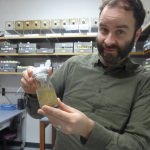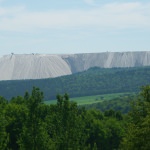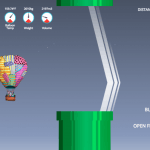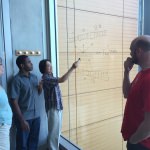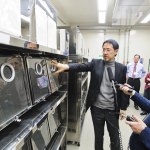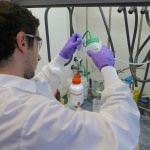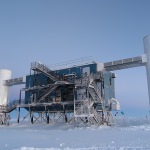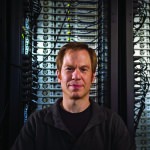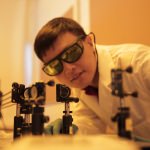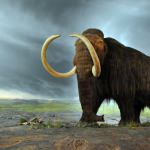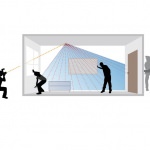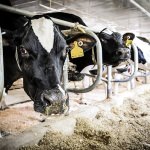Category Science & Technology
Fruit flies help explain differences between males and females
John Pool, assistant professor of genetics at UW–Madison, studies evolutionary genetics in his “fly room.” David Tenenbaum Vive la difference! Trust the French… Read More
UW experts contribute to NAS report on U.S. science literacy
Despite perceptions that too many Americans are ignorant when it comes to the realm of science, a new study reports that people in the United States actually “perform comparably to adults in other economically developed countries on most current measures of science knowledge.” Read More
Businesses spawned at UW–Madison take two of three pitch night awards
A “pitch night” at the Madworks business accelerator on campus made significant monetary awards to two Madison businesses with roots in UW–Madison Monday. Emonix won the $5,000 economic impact award for a patent-applied-for system that reduces salt usage in water softeners. Read More
Gamer-Teacher collaboration yields nine middle school science games
Nine educational video games developed in an unusual collaboration between middle school science teachers and expert game developers have been released nationally by Field Day lab, a project of the University of Wisconsin–Madison's Wisconsin Institute for Discovery. Read More
Learning like humans, machines extend the reach of research
A growing group of University of Wisconsin–Madison researchers is working on ways to use computers to make better use of human brain power. Read More
UW-Madison spinoff releases latest educational game – aimed at fractions
A Madison maker of educational games has just published Diffission, a visual game to teach fractions to middle schoolers without the pain of the traditional “skill and drill.” Read More
WARF, UW–Madison again rank in top 10 universities for U.S. patents
Pharmaceuticals and drug discovery, medical imaging, materials and chemicals, information technology and clean technology were the leading categories of WARF-UW-Madison patents. Read More
‘Accidental techie’ from UW–Madison is IT entrepreneur
Applied Tech in Madison provides network and computer services to businesses and organizations across Wisconsin. The blue screen at center shows the status of… Read More
UW-Madison technology enlisted in battle against hepatitis B
A method that emerged from a UW–Madison spinoff company is in clinical trials in Europe, Asia and the United States against the infection, which can destroy the liver. Read More
Tiny high-performance solar cells turn power generation sideways
The miniature solar panels could power myriad personal devices — wearable medical sensors, smartwatches, even autofocusing contact lenses. Read More
Giant forest fires exterminate spotted owls, long-term study finds
A UW–Madison research group has documented an exodus of owls following the fierce, 99,000 acre King Fire in California in 2014. Read More
UW researchers contribute to study of mammoth survival on tiny island
Geography Professor John “Jack” Williams and his graduate student Yue Wang say the information is relevant to small oceanic islands today and the people and animals that live on them. Read More
Cataclysm at Meteor Crater: Crystal sheds light on Earth, moon, Mars
In molten sandstone extracted by prospectors a century ago, an international team of scientists has discovered microscopic crystals telling of unimaginable pressures and temperatures when an asteroid formed Meteor Crater in northern Arizona some 49,000 years ago. Read More
UW2020: WARF Discovery Initiative proposals selected
The 14 research and infrastructure projects have the potential to transform robotics, cancer treatment, data science and more, including efforts to grow new neurons to foil Parkinson’s disease and approaches to expand children’s vocabularies to make them better students. Read More
Happy hormone’s calcium connection may make cows and humans healthier
Serotonin is best known for eliciting feelings of happiness in the human brain, but scientists at the University of Wisconsin–Madison have found the hormone plays a role in milk production in dairy cows — and may have health implications for breastfeeding women. Read More

